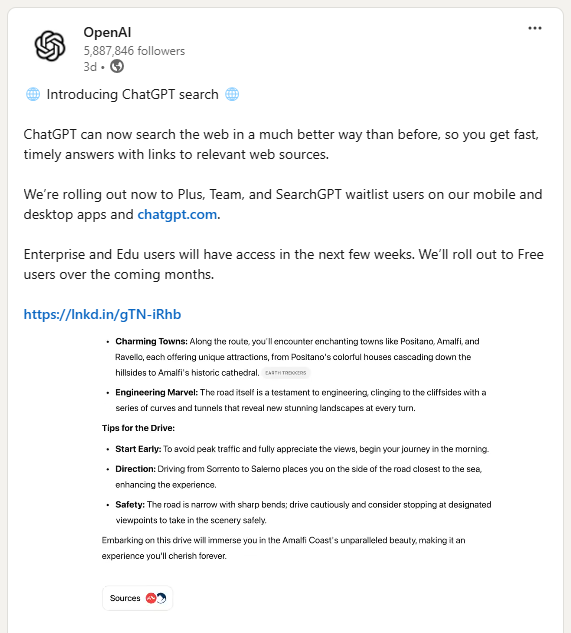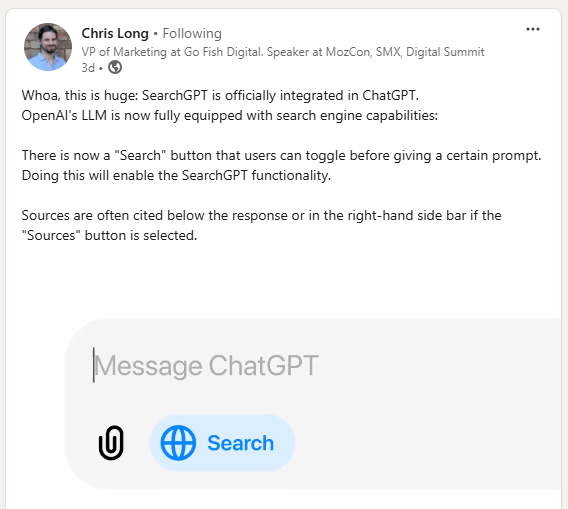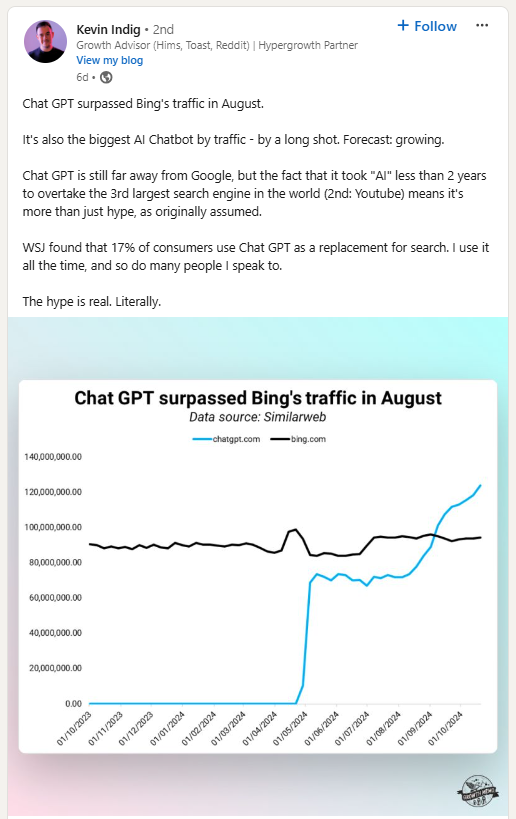SearchGPT combines real-time search with conversational AI. This integration offers a unique solution to the limitations of traditional search engines. With SearchGPT, users gain access to accurate, up-to-date information whenever they need it.

What is SearchGPT?
SearchGPT is a new feature in ChatGPT designed to bridge the gap between static AI responses and the real-time nature of web data. When incorporating live search capabilities, SearchGPT allows ChatGPT to pull in the latest information from the internet. This enhancement improves its ability to provide accurate and up-to-date responses on trending topics, breaking news, and evolving subjects.
Origins of SearchGPT
The development of SearchGPT stems from OpenAI’s commitment to making ChatGPT a more versatile tool by addressing a critical limitation: access to the latest information. Initially, ChatGPT was trained on a static knowledge base with a cutoff date, meaning it couldn’t stay updated on recent events.
OpenAI’s solution was SearchGPT, which allows ChatGPT to retrieve fresh data directly from the web. This development began as OpenAI sought to meet user demand for a more comprehensive AI that can provide not only historical knowledge but also the most recent updates and answers.
Core Functionality
At its core, SearchGPT operates by initiating a real-time search when it encounters questions or topics that may require the latest information. This search retrieves relevant web pages, articles, and reports, which ChatGPT then synthesizes into a coherent response.
Because it integrates live web data, SearchGPT ensures that users receive responses that reflect the current state of knowledge on a subject. It bridges AI’s static training data with online sources to enhance ChatGPT’s conversational depth and reliability.

How SearchGPT Enhances ChatGPT’s Utility
Integrating real-time search capabilities with ChatGPT elevates the AI’s overall utility, making it a more powerful tool for users who need accurate and up-to-date information. With SearchGPT, ChatGPT becomes an AI that can provide relevant insights and precise answers across a broader spectrum of queries, responding to real-time changes in topics like news, trends, and even niche industry updates.
Solving the Knowledge Cutoff Issue
One of ChatGPT’s initial limitations was its static knowledge base, with data that eventually reached a cutoff point. This meant that any developments, events, or information emerging after that cutoff were inaccessible to users.
SearchGPT directly addresses this by enabling ChatGPT to search the internet in real time, providing answers that reflect the latest information. This enhancement overcomes the constraints of the knowledge cutoff, allowing ChatGPT to deliver responses that are accurate and current, regardless of when the topic arose.
Expanding Use Cases
With real-time search, SearchGPT unlocks new applications for ChatGPT. Users can now rely on ChatGPT to stay updated on trends, news, and time-sensitive topics, making it ideal for tracking market shifts, industry insights, and daily headlines. It also opens doors for more personalized recommendations, whether in areas like product suggestions, entertainment, or travel tips, as it can pull in recent data and adapt recommendations based on up-to-the-minute trends. This expansion in use cases makes ChatGPT a more versatile tool that meets a wide variety of user needs in real-time.
Key Features of SearchGPT
SearchGPT offers a suite of features that blend the best of search engines and conversational AI, delivering an interactive and highly informative experience. Unlike standard search engines that provide lists of links, SearchGPT offers synthesized answers, seamlessly integrating real-time search results with ChatGPT’s natural language understanding. This combination of customizability, AI summarization, and multi-source aggregation sets it apart as a unique, powerful tool for users seeking timely and detailed information.
Nathan Gotch, Co-Founder of Rankability and Founder of Gotch SEO Academy, has an interesting breakdown in this Twitter/x.com post:
Customizable Search Settings
One of SearchGPT’s standout features is its customizable search settings. Users can apply filters to refine search results based on factors like date, source type, or relevance, tailoring responses to match their specific needs. This functionality allows for a more targeted search experience, enabling users to receive answers that are relevant, focused, and aligned with their preferences, whether they’re looking for recent updates, historical context, or expert insights.
Integrated AI Summarization
With SearchGPT, ChatGPT goes beyond merely presenting search results by generating concise, context-rich summaries of the information found. Rather than overwhelming users with raw data, it synthesizes the most relevant points from search results into a cohesive answer. This approach provides clarity and saves time, and it’s especially useful for multi-faceted, complex queries.
Multi-Source Aggregation
To ensure that responses are comprehensive and reliable, SearchGPT pulls information from multiple reputable sources. This multi-source approach enriches answers by blending perspectives and facts from across various outlets, reducing the risk of bias or misinformation. Because it cross-references information, SearchGPT delivers responses that reflect a well-rounded view. This feature makes it ideal for questions that benefit from a broader, multi-faceted understanding.
Real-Time Alerts and Updates
A potential addition to enhance SearchGPT’s functionality could be real-time alerts or updates on specified topics. This feature enables users to receive notifications when significant updates or changes occur in their chosen areas of interest, such as market trends, news, or industry developments. This capability could transform ChatGPT into an information companion, providing proactive updates alongside user-initiated searches.
Contextual Query History
SearchGPT could further benefit from a feature that remembers previous queries within a session, allowing it to build on prior searches for more contextually aware responses. This would make it easier for users to follow complex topics or track an evolving conversation without reintroducing background information. Because it maintains context across questions, SearchGPT would offer a more seamless, intuitive experience for users engaged in in-depth research.

Impact on Search Engines
SearchGPT is poised to make waves in the search engine market by offering a unique blend of real-time search capabilities with AI-driven, conversational insights. This feature may redefine users’ expectations of online search by combining the informative depth of search engines with the interactive nature of AI. It presents a fresh alternative to traditional search models.
The result?
ChatGPT may become a primary search tool for users seeking both immediacy and contextual understanding.
Disrupting Traditional Search Models
Unlike conventional search engines like Google and Bing, which provide lists of web links and rank results based on relevance algorithms, SearchGPT offers a more direct user experience. It focuses on delivering answers rather than just presenting links. Rather than scrolling through multiple sources, users receive synthesized responses, allowing them to access information more efficiently.
This shift caters to users who prefer concise, actionable answers without sifting through pages of content. As a result, SearchGPT challenges the conventional search model by prioritizing relevance and coherence over raw data retrieval. It sets a new standard for immediacy in search experiences.
AI-Driven Search Experience
SearchGPT’s integration of conversational AI changes how users interact with search, making it more interactive and responsive to follow-up questions. Because it embeds search within an AI conversation, SearchGPT creates a context-aware experience that mirrors human dialogue. This approach transforms search from a static query into an ongoing interaction. An AI-driven approach aligns with users’ growing preference for personalized, adaptable search experiences.
Blending Search and Assistant Roles
SearchGPT could enhance its utility by acting as both a search tool and a digital assistant. This functionality would allow it to handle tasks beyond search, such as providing reminders, calendar updates, or task recommendations based on a user’s interests or queries. When blending search with assistant capabilities, SearchGPT could offer a comprehensive experience, further setting it apart from traditional search engines and enhancing its value as a daily tool.
Influence on SEO and Content Strategy
SearchGPT’s rise could impact how websites and content creators approach SEO, as it favors direct answers over links to web pages. Content strategies may need to adapt by focusing on concise, answer-rich information and conversational language that aligns with AI-driven queries.
This shift could encourage the creation of more structured, answer-oriented content to increase visibility in AI-based search environments, fundamentally changing how organizations approach online content in an AI-integrated market.
Potential Applications for Businesses and Marketers
SearchGPT opens up new opportunities for businesses and marketers by providing instant access to real-time data and facilitating more efficient customer interactions. SearchGPT could quickly become an asset for organizations seeking to strengthen their market position through timely insights. It also enhances their capabilities in responsive customer support and adaptive content strategies.
Its ability to retrieve and synthesize information rapidly makes it a powerful tool for these goals. This tool can drive smarter, faster decision-making, empowering brands to remain competitive and responsive.
Real-Time Market Insights
For businesses focused on staying ahead of industry trends, SearchGPT offers a quick and powerful tool to gather immediate market insights. When leveraging its real-time search capabilities, companies can track emerging trends, competitor strategies, and shifts in consumer behavior as they happen.
This feature enables content marketing managers to make data-driven decisions based on current information, which is invaluable in competitive markets. Additionally, the ease of accessing live insights allows for faster responses to market changes, giving businesses a competitive advantage in both strategy and execution.
Enhanced Customer Support Tools
SearchGPT can transform customer service by offering up-to-date, conversational support that responds to customer inquiries instantly. When integrating SearchGPT into customer support workflows, businesses can provide users with accurate answers to their questions, even on evolving topics like product updates, industry news, or service changes.
This feature creates a more seamless, human-like interaction that builds customer trust and satisfaction while freeing up human agents for more complex tasks. The adaptability of SearchGPT’s responses also makes it well-suited for handling a wide range of customer service queries with relevance and immediacy.
Content Creation and SEO Strategy
With SearchGPT, businesses and marketers can elevate their content creation and SEO strategies by tapping into the latest keyword trends and real-time topics. SearchGPT can help identify popular search terms and emerging issues, allowing content creators to stay relevant and optimize their material for current search demands.
This approach supports a proactive SEO strategy, where content is regularly aligned with what consumers are actively searching for, boosting visibility and engagement. Moreover, by generating concise and informative responses, SearchGPT can assist in crafting content that appeals to both audiences and search engines, offering a practical tool for ongoing content optimization.
Data-Driven Audience Insights
For a more targeted approach, SearchGPT can be leveraged to provide data-driven insights on specific audience segments. This helps marketers understand preferences, behaviors, and feedback patterns. When analyzing real-time data specific to a target demographic, businesses can refine their messaging and campaign strategies.
This approach helps them better align with customer needs and enhance personalization efforts. That capability would enable businesses to adapt rapidly to audience preferences, ensuring that their outreach is as relevant and impactful as possible.
Competitive Analysis and Benchmarking
Another potential application of SearchGPT lies in competitive analysis and benchmarking. Businesses can use SearchGPT to monitor competitor activities, evaluate industry benchmarks, and analyze product or service positioning.
When collecting real-time data, companies can compare their performance metrics to industry standards, helping them adjust strategies and set more achievable targets. This feature could also assist in identifying areas where competitors excel, inspiring innovation, and fostering continuous improvement across marketing and operational efforts.
Limitations and Ethical Considerations
While SearchGPT offers substantial advancements in real-time data access, it also brings certain challenges that must be carefully managed. Issues around accuracy, source reliability, privacy, and ethical implications are crucial to consider to ensure that SearchGPT remains a trustworthy and responsible tool. Addressing these concerns is essential for building user confidence in AI-driven search, especially as the technology continues to evolve and gain widespread use.
Information Accuracy and Source Verification
One of the primary limitations of real-time AI-driven search is the potential for misinformation or inaccurate responses. Since SearchGPT aggregates data from multiple sources, ensuring that each source is credible and current is critical to maintaining accuracy.
There’s also a risk that SearchGPT may pull from unreliable or biased sources, inadvertently propagating misinformation. For businesses and individuals relying on accurate data, source verification and a consistent vetting process become necessary to uphold the integrity of AI-generated responses.
Privacy and Security Concerns
Gathering real-time information involves privacy and security considerations, particularly when accessing sensitive data. SearchGPT’s ability to pull real-time data means that privacy safeguards must be in place to protect user information and respect boundaries around sensitive sources. Ensuring that SearchGPT complies with data protection standards and responsibly manages user data is crucial in maintaining trust and preventing potential misuse of private or proprietary information.
Ethical Use of AI in Search
The broader ethical implications of AI-driven search also require careful consideration. The adoption of AI in search raises questions about its impact on jobs within the search industry, as automated systems may reduce the need for human oversight in certain roles. Additionally, there are concerns about how AI could shape human information consumption, potentially reinforcing biases or creating echo chambers.
Responsible use of AI involves balancing technological advancement with these ethical concerns, ensuring that AI augments human decision-making rather than replacing it and fosters well-rounded, unbiased information access.
Managing AI Bias and Transparency
To promote ethical usage, a potential enhancement for SearchGPT could involve implementing bias detection and transparency tools. When flagging potential biases in sources and offering users insight into how information is selected and synthesized, SearchGPT can encourage more informed use of AI-driven responses. Transparency measures like highlighting the origin and reliability score of each data source empower users to evaluate the information provided critically.
Responsible AI Use Policies
Another consideration is the establishment of responsible AI use policies that define boundaries for ethical application and data handling. These policies could outline best practices for gathering and presenting information, establishing safeguards against misuse, and setting standards for ethical AI deployment.
Real-Time Information Access with SearchGPT
With SearchGPT, ChatGPT elevates the user experience, providing an adaptable tool that’s both timely and insightful. This combination of live data and conversational AI marks a significant leap forward in search technology.
